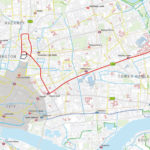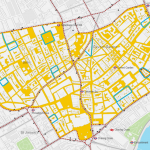A growing sustainable transport trend, experimental ‘dockless’ cycle hire programmes have recently been carried out within Manchester, Cambridge and Oxford, as well as numerous schemes also being introduced within London.
The concept of ‘Dockless’ cycling involves using a GPS smartphone app to find and ‘enable’ a bike, with a Bluetooth connection releasing the wheel lock, once a bike’s QR code is scanned by the user. Once the cycle is no longer needed, the user can leave the bike wherever convenient (within reason) and deactivate it from use by others via the app.
Why dockless?
Introduction of a ‘dockless’ aspect to cycling is anticipated to increase the spread of bikes across London and hence boost accessibility for all. In particular, this would benefit those missed out by the existing docked hire schemes. As a whole dockless schemes are promoted due to their flexibility and convenience for disposing bikes wherever…whenever! Walking and Cycling Commissioner, Will Norman supports dockless schemes but intends to monitor where bikes are being left, to ensure footway space is maintained for disabled users.
A dockless trial undertaken within LB Hackney used a ‘geo-fence’ to limit use of the bikes to within the borough only.
Obike…
During July of this year Obike introduced 400 bikes within Tower Hamlets. Other similar dockless cycle schemes including Mobike, Ofo, Urbo have also been trialled elsewhere in London.
Despite only starting up during 2017, Obike have demonstrated success implementing dockless cycle hire schemes all over the world, starting in Singapore, before spreading to Malaysia, Australia, and Taiwan. The Netherlands were Obike’s first European venture in June 2017, followed by Switzerland and now the UK.
A review article of Obike scheme in the Guardian, highlighted that a huge benefit of dockless hire schemes was the significant savings; the scheme held no cost to Tower Hamlets compared to previous extensions of the Barclays Bikes which cost around £2,000,000.
Challenges
However, a major worry of the scheme, associated with no permanent location for storage is the potential for messy, disorderly streets. Obike have produced the following guidance for users in order to regulate where cycles are left, to prevent this from being an issue:
Cycles can not be left: on private property, obstructing pavements, on grass/green spaces or in the way of entrances.
Obike have also responded to fears associated with user confidentiality including tracking of individuals using the app, by promising to protect user data by not selling it to third party companies. Additionally, they reason that tracking would be associated with the bike’s GPS rather than users or through the app.
The use of borough-wide geo-fence controls will also be of significant interest in achieving other local transport objectives, such as the management of pick-up locations for Uber. Momentum recognises the significant benefits dockless cycle hire holds for the future and therefore anticipates greater incorporation of schemes alongside future development, due to the benefits associated with reduced cost and ease of introduction to new areas, in addition to the ability to modernise and gain greater public space by eliminating requirement for infrastructure.
More information on Obike can be found at: https://www.o.bike/#page1
Related articles
http://uk.businessinsider.com/bike-sharing-startup-ofo-launches-in-london-2017-9
http://www.cityam.com/271340/ofo-and-urbo-latest-bike-sharing-startups-hit-londons
http://urbosolutions.com/dockless-bike-sharing/






